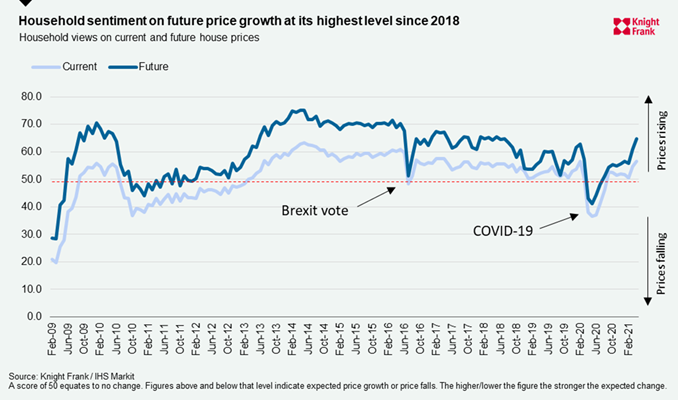Midweek property news update - 21 April
Markets dip as cases rise, the resilience of UK jobs and new UK climate targets pin hopes on green homes
4 minutes to read
Markets dip as cases rise
The FTSE 100 fell the most in two months yesterday amid rising global Covid-19 infection rates. Volatility continued overnight with renewed pressure on oil prices due to the worsening situation in India, the third largest oil importer.
Success in wealthy western democracies stands in contrast to the reality that more people were diagnosed with Covid-19 last week than any week since the start of the pandemic. All regions except Europe reported rising cases, with south east Asia the worst hit, according to the WHO.
All this should be considered alongside data from various nations from France and the US to the UK and Chile that shows the vaccines are working, though the uneven roll out is likely to prolong the crisis, according to the WHO.
Events in India, where the turn has been relatively quick, illustrates the threat. Positive tests are climbing at the fastest rate in the world, jumping from 3% to 16% in a month. Only 8% of the population has received at least one vaccine dose to date.
The resilience of UK jobs
The UK jobs market continues to surprise on the upside. The unemployment rate fell for a second month in a row to 4.9% during the three months to February. Economists polled by Reuters had been expecting a rise to 5.1%.
The ONS data, though broadly positive, reveal the extent to which job losses have been felt most by the young. More than half of the 813,000 jobs lost since the onset of the pandemic were held by people aged under 25, with hospitality-heavy London the hardest-hit region. Even so, forecasters including EY now expect the unemployment rate peak to be limited to under 6% in Q4, down from previous expectations of at least 7%.
Other economic indicators show output growing rapidly. The latest 'Recovery Tracker' from Lloyds Bank shows 11 out of 14 sectors reported output growth in March, the highest since September 2020. The pound climbed to its highest in more than six weeks against the dollar yesterday, surpassing $1.40 before settling at $1.39.
Confidence drives housing markets
A boom in consumer confidence driven by the success of the vaccine roll out in developed economies is fuelling housing market activity from Canada to Australia.
The latest house price sentiment survey results from IHS Markit suggest UK households are more confident about future price growth than at any time since mid-2018 (see chart below courtesy of Oliver Knight). Expectations of current price growth are at their second highest level since mid-2017.
For more UK housing market trends and data, see the latest monthly update from Chris Druce. For more on the capital's prime markets, see the new London Review.

Lockdown's cash pile, continued....
We talk a lot about the growing pile of cash built up by savers globally during the pandemic, see Monday's note. The scale of the cash pile and the unprecedented nature of current events means forecasts for growth could be substantially wide of the mark if consumers opt to spend more or less as economies reopen.
New research published by the European Commission pours some cold water on hopes for a consumer spending boom in the region, suggesting excess savings seem to be concentrated among high-income earners whose propensity to consume is relatively low.
Previous analysis from Bloomberg reveals excess savings are concentrated largely among those aged 65+. Lower income, younger households, meanwhile, have saved a great deal less and are less likely to make major purchases.
Solving the green homes problem, continued...
Prime minister Boris Johnson will in coming days announce a new pledge to reduce emissions by 78% by 2035 compared to 1990 levels, according to this report in the FT. That's another big step forward from the government's previous aim of a 68% emissions reduction by 2030, already one of the most ambitious plans among developed economies.
The FT cites a report by the Climate Change Committee, the government’s independent advisory group, highlighting the introduction of low-carbon heating systems in homes as a key plank in achieving the goals.
The government has a patchy record when it comes to driving regulatory improvements to housing emissions. Retrofitting homes is expensive, and last month it scrapped the green homes grant after just six months. Perhaps we'll see a step change, or progress may instead be driven by markets via financial incentives like Green Mortgages. See the latest edition of the Intelligence Talks podcast for more on that.
In other news...
Equity Release is increasingly being adopted by the wealthy as a strategic tool for estate planning. See this report from later life finance expert David Forsdyke for more.
To what extent does a commercial building’s #BREEAM rating drive the rent it achieves? Using vast amounts of our own data, and that of our friends at BRE, we’ve quantified the relationship – and the results are fascinating. To find out more, sign up for a webinar starting tomorrow morning at 09:30 BST.
Plus, get ready for a coal and gas rebound, one in three UK employees worked from home last year, US developers flock to cold storage, pandemic hits UK household finances harder than EU peers, promises of a Covid pill, luxury brands use blockchain to prove authenticity, and finally, how can Boris Johnson hit his ambitious new carbon-cutting target?